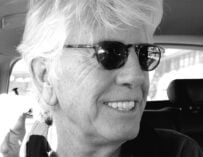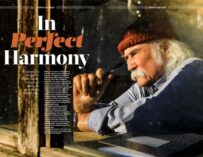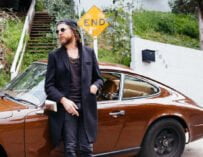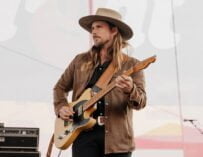Having spent much of his life in two of the world’s biggest bands, he’s enjoying some time on his own
Despite being a name that most will know, Graham Nash is still synonymous with the music he has created with his groups The Hollies and Crosby, Stills & Nash (and Young, from time to time). His recent live performances have afforded him the opportunity to strip back some of his best-loved compositions and reclaim them, almost as if they were solo songs.
That same ethos is there on new album, Over The Years, which presents a remastered selection of his work alongside the original demo recordings. Once again, without the lush production and bandmates, it’s another chance to enjoy these tunes in their purest form and reappreciate the man who created them.
We recently caught up with Nash to talk about his upcoming shows, new album and the troubles facing Trump’s America…
With such a large body of work, how do you decide upon your setlist?
“I tend to do it like this… I realise that people spend their very hard-earned money to come and see me and they’re expecting to hear certain things. They’re expecting to hear Our House and Teach Your Children and I know that and so I try and put myself in the same emotional state that I was in when I wrote those songs. That’s how I’m able to sing them night after night and not get totally pissed off. I then have a skeleton for the show, because I know the 10 songs that they definitely want to hear and will be disappointed if they didn’t.
“I’ve got about 25 songs in my set, so I now have 15 songs to figure out what I would like to play. One of the great things about the small intimate places that I’m playing in is that I get to do what I want to do. I don’t have to ask David or Stephen or Neil anything and it’s very freeing in a way. I’m enjoying these tours tremendously.
“I want my audience to know two things. One, I want to be there for them. It’s not like I’m going through the motions or I’m phoning it in. I want to be there and my audience know it. And the second thing I want is to see them smiling on the way out. That’s when I know that I’ve done my job as a musician.”
Is there a third desire, a little bit of education into songs that they might not know were written by you?
“Absolutely. There’s one line from a song on my new record called Myself At Last, ‘Is my future just my past?’ and what I meant by that is that there are a lot of people who know Graham Nash but there are a lot of people that don’t know me other than as part of CSN or CSNY but I don’t want to be that anymore. I know what we did, I know we were a damn fine rock ‘n’ roll band with some very interesting songs to sing, but that part of my life is over.
“So I don’t want to be trapped by my past and I’m finding that when I take all the songs down to the very essence of how they were written with either an acoustic guitar or simple piano you know pretty soon whether or not you’ve got a good song or not because the audience will respond and let you know exactly how they feel about it. That’s one of the things I love about these small theatres. I can see their eyes, I can see if I’m getting through.”
How hard is it to strip those tracks back?
“It’s not hard at all because I realised that I’ve written some pretty decent songs in my life. And that’s nice to know.”
Do these shows also give you a chance to fix a song and make them closer to how you perhaps wanted them to be originally?
“I’ll never sing a song that I don’t like, what the fuck is the point of that? I do make it slightly different every night, I change the rhythm and the structure but I know that they want to hear Our House in its purest form. I have a new record that’s about to come out called Over The Years and it has 15 of my most popular songs and 15 of the demos of those songs, so you can hear me do Teach Your Children on an acoustic guitar in 1968 having just heard the record of it that CSN made in 1969.”
Do you enjoy going back and listening to those old songs?
“I don’t think ‘enjoy’ is the right word. I discover little jewels that I had forgotten about that I then want to sing that night and very often we make left turns on our setlist. Quite frankly, the setlist is only a sheet of paper to annoy our crew because we never stick to it. But I’m having a great time on these tours. I feel appreciated, I feel loved, I feel understood. I’m having a good time.”
When writing a song, does it ever come into your head that you might still be singing it five decades later?
“Well, now I know that, after all these years, but in the early years you were doing it day-to-day. You count yourself lucky if you were still writing and still creating, I never thought in 1969 that I would still be singing in 2018, I didn’t realise that at all. Don’t forget, you weren’t supposed to trust anybody over 30. But now I’m 76.”
Similarly, when you’re writing a batch of songs for an album, can you tell the songs which people will latch on to?
“Absolutely, I’ve learned how to do that in the 50-odd years that I’ve been making music. I’ve learned to create melodies. Particularly with The Hollies, we were able to create some really interesting melodies that you could hardly forget once you’d heard them a couple of times. I realised when I joined David and Stephen and Neil, and was living with Joni, that if I took my training with The Hollies to create interesting melodies and put better words to them, instead of made-up sounds like On A Carousel, then I could write better songs. David and Stephen and Neil and Joni were writing songs that were really deep and intensely personal and important and I realised that my songwriting would have to change and get better and grow.”
In that incredible company, you had to raise your game…
“You certainly do. That’s one of the things that I love about playing with Neil Young, and when you’re playing with Neil Young you better have your shit together because he is always together.”
What do you think you brought to their songwriting game?
“I have no idea. I write completely differently to Neil or Stephen or David, we all do. Look how brilliant those musicians are. You’re talking about Neil Young and Stephen Stills and David Crosby for God’s sake, incredible musicians. I don’t put myself anywhere close to their musicianship. Crosby is completely unique, jazz-influenced. Stephen, completely unique, blues-influenced. Neil, who knows what Neil is but he was a great addition to our music. He brought an edge to it, moody and deep. I’m very proud of all the stuff we’ve done and the truth is that if CSN or CSNY never make another note of music together, look at what we did in our lives?”
Was it important to you to go off and do your solo albums and then come back to the band and how did you manage to do that?
“It’s just a juggle. Life is the biggest juggle of all, it’s incredible to try and keep it together in this world. Over 50 years I’ve never seen it so crazy. I think that we’re looking at the demise of the America.”
Do those current events have an influence on your setlist too?
“Sure, absolutely. I’ll give you an example of that. One day Shane [Fontayne] and I heard that a black teenager had been shot dead by the police in Ferguson, Missouri and left in the street for four hours. When we heard that Michael Brown had been killed like that we wrote a song that morning and performed it that night and that’s how much David and Stephen trust me. When one of your members wants to do a brand new song that you haven’t even heard, it takes courage to say, ‘Go ahead,’ but they trusted me. It’s a song called Watch Out For The Wind. So yeah, I’m definitely courageous enough to sing a song that I wrote that morning.”
So you still see your music as something to inspire and bring hope and peace to the world?
“I think it’s getting increasingly valuable to be able to go to a beautiful concert hall and have an evening of nice music. Music that will make you think and also move your arse around. I want to do it all. There are no rules. All I want to do is feel great about the night and I’ll do anything to make that happen. I have a lot of music to make, I’ve written a lot of music in my life and it’s so satisfying to see people understand what I’m trying to do. I don’t have any answers, I have a lot of questions but it’s hard to get a good answer nowadays.
“One of the things I love about America is that I get to speak my mind. The stuff that David, Stephen and Neil and I have been talking about for all these years, we might not have been able to get away with that in a different country, we may have already been disappeared. But in this country you can speak your mind, nobody has to listen and nobody has to agree but you get a chance to tell people how you feel and I’m very pleased with that over here. Unfortunately, Trump seems to be on the opposite side of that, he’s on the side of shutting people up and jailing journalists and whistle-blowers. With all due respect, this is a really great country and I really truly feel that we deserve better.”
Do you see parallels over here in the UK as well?
“Yes, on the last couple of tours I’ve done I’ve been seeing it all over Europe, particularly in Germany. I’ve seen the rise of the right-wing and the immigrant haters and thinking that those who are a different colour are lower than them. I’ve seen it all over the world.”
Do you think creative people have a responsibility to try and affect a change?
“I don’t think it’s a responsibility, it’s just something I do as a human being. I wake up in the morning and I check the news and I check the internet. I have to feel something before I start to write about it, so when I see something in my world that I feel strongly about, that’s when I start to write. And it’s always been that way.”
How was that social conscience instilled in you?
“Having been born during the last three years of World War II, knowing that me and my fellow English people twice survived a World War – give me a problem that’s really a problem, don’t tell me the fucking coffee is not quite hot enough! We made it through two wars and that gives you a certain attitude that there’s not really a lot of problems that can’t be solved with a smile and a good conversation. People have forgotten that and people like Trump are happy that you’ve forgotten it.”
Did all the social change of the 60s and 70s, enable you to be so prolific with your writing?
“There was a tremendous amount going on in those days, it was crazy. In particular 1974 when CSNY did that tour of stadiums, I think it was the first time in history that a group had done a tour of stadiums, sure The Beatles had done Shea Stadium and the Stones had done Hyde Park, but we did 35 shows in stadiums and that’s why I worked so hard on the CSNY 1974 boxset because I wanted people to know that Crosby, Stills, Nash and Young were a really fine rock ‘n’ roll band. But yes, it was a crazy time; human rights, the rights of African Americans, women’s issues, Vietnam, it was crazy, but it’s crazier now I’m afraid because of this Trump administration. They are sending this country back fifty years, particularly on women’s issues.
“We never wanted to preach, we just wanted people to know more information so they could make up their own minds. One of the things I’ve been very hopeful about is this latest movement of the kids against the gun lobby and the NRA because of the school shootings in places like Parkland in Florida. If they keep us this momentum they will defeat the gun lobby and the NRA and that’s saying something. They will change the laws of this country and I feel great about seeing them do this. These kids are so eloquent and know their facts so well and are great speakers and passionate about what they’re doing. When somebody like Laura Ingraham tried to bring down one of those Parkland students she got a tremendous backlash from the internet about her comments. It’s not an invisible world anymore.”
Is that inspiring for you as an artist?
“How could you be an artist in today’s age and not be influenced by everything that goes on around you. Part of our job is to talk, write and sing about these times in which we’re living now. It’s fascinating.”





































Related Articles